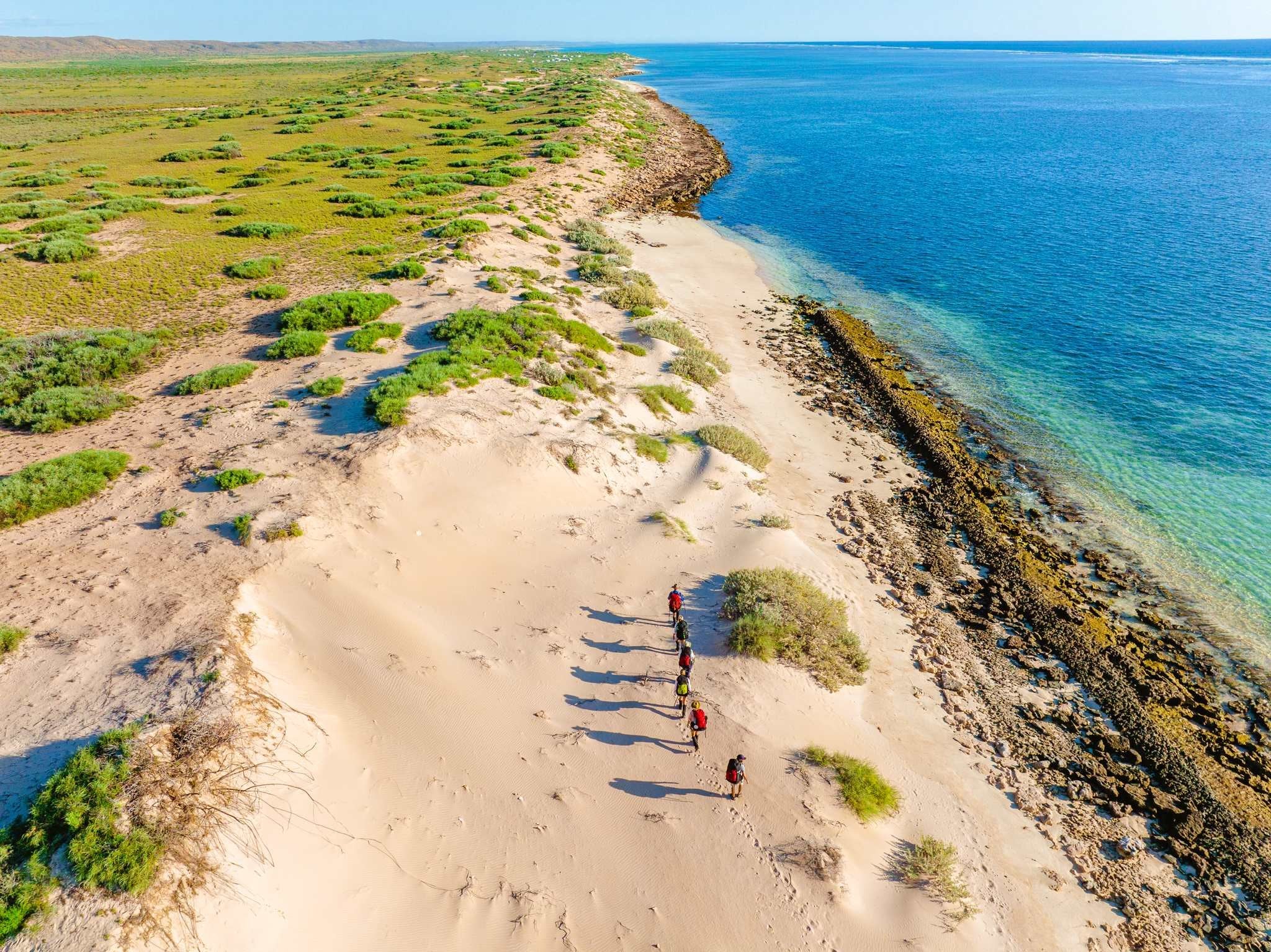
3‑Day Trek from Exmouth to Ningaloo | Cape Range National Park
📍 Exmouth, WA | Guided | All Inclusive ✅
This exclusive 3-day traverse takes you deep into Cape Range before finishing at the iconic Ningaloo Coast.
Cross an entire national park on foot—from desert ridges to turquoise reefs.
Verified Reviews
Live Dates, Matched Prices
Secure Payment Portals
Vetted Tour Operators
200% Climate Positive
Verified Reviews
Live Dates, Matched Prices
Secure Payment Portals
Vetted Tour Operators
200% Climate Positive
Exmouth, WA
Moderate
Camping
200% CO₂ Offset

Epic 3-Day Ningaloo Trek | Exmouth's Untouched Wilderness

























Tour Overview
Cape Range Traverse: 3-Day Ningaloo Wilderness Coast-to-Coast Trek Cross the entire Cape Range in three unforgettable days – from arid inland ridges, hidden gorges, fossil terraces, and finish with your boots in the turquoise shallows of Ningaloo Reef. Fully guided, pack-carrying adventure with 200% carbon offset and strict zero-trace practices.
Tour at a Glance
- Duration: 3 days / 2 nights
- Age: 15+ (fit minors with adult)
- Group size: Max 8 hikers
- Difficulty: Moderate–challenging – 10–15 km/day with steep sections, full pack carry (14–17 kg)
- Camps: 2 nights wild beach & ridge camps (all gear supplied)
- Start / Finish: Exmouth, Western Australia
What’s Included
- All camping equipment (2-person tents, sleeping bags rated 5 °C, thick mats, head torches)
- All meals: breakfast Day 1 → lunch Day 3 (hot breakfasts, fresh lunches, trail dinners + snacks & electrolytes)
- Expert wilderness guide + support vehicle for emergency access
- Return 4WD transfers from Exmouth accommodation
- Cape Range National Park fees & Indigenous land-use contribution
- Group snorkel gear (mask, snorkel, fins, stinger suits)
- Emergency satellite communicator & first-aid
- Full 200% CO₂ offset
Not Included
- Flights to/from Learmonth (Exmouth) Airport
- Pre/post-tour accommodation in Exmouth
- Mandatory remote-area travel insurance
- Personal clothing, boots & backpack
- Alcohol & extra snacks
- Tips
Day-by-Day Itinerary
- Day 1: Exmouth → Inland Ridges → Ridge Camp 08:00 pick-up – transfer to eastern trailhead – follow dry creek beds & canyons up onto the range – sweeping views over Exmouth Gulf – high wild camp & stargazing
- Day 2: Ridge Traverse → Mandu Mandu Gorge → Beach Camp Cross the limestone spine – descend stunning fossil terraces – emerge at Ningaloo shoreline – afternoon swim & sunset dinner on the sand
- Day 3: Coastal Walk → Turquoise Bay → Exmouth Morning beach & dune walk (turtles, rays, possible whales) – final snorkel at world-famous Turquoise Bay – vehicle return to Exmouth ~15:00
Essential Packing
- Broken-in hiking boots with ankle support
- 55–65 L backpack & rain cover
- Reef-safe sunscreen, hat, polarised sunglasses
- 3 L water capacity (no taps on trail)
- Swimsuit & small pack towel
Only 8 packs per departure – the full Cape Range crossing almost no one ever does. Zero Trace Tours dates vanish in hours – secure your coast-to-coast Ningaloo trek today!
OPEN | Live Dates & Prices
Tour Itinerary
Day 1 | From Foothills to Ridge Country
Distance: 14km · Grade: Moderate
The trek begins inland, where the eastern foothills of Cape Range rise from the red earth. After an early morning gear check and briefing near Exmouth, the group sets out on foot—following dry creek beds and sweeping canyon lines toward the spine of the range.
It’s a steady climb, with every step offering broader views over Exmouth Gulf and the vast emptiness beyond. By afternoon, the group reaches the heart of the Cape: high, remote, and silent.
Camp is set among ancient limestone and open sky. As night falls, the stars arrive in their thousands.
Day 2 | Descent to the Ningaloo Coast
Distance: 15km · Grade: Moderate to Challenging
Wake with the sun and follow the range west toward the sea. The route runs alongside Mandu Mandu Gorge, where glimpses of the Indian Ocean appear on the horizon.
Descend through exposed wave-cut terraces—fossilised remnants of an ancient reef—until land gives way to turquoise water.
The day finishes on the shoreline of Ningaloo Reef, where a post-hike swim feels more like a reward than a rinse. Camp is pitched on soft sand just metres from the tide line.
Dinner is served with a sunset, and the night sounds of ocean and wind replace all else.
Day 3 | Coastal Traverse to Turquoise Bay
Distance: 8km | Grade: Easy
Ease into the final day with a gentle hike north along the edge of the continent. This stretch follows quiet beaches, rocky headlands, and dune-backed coves—prime territory for spotting rays, turtles, and even the occasional breaching humpback.
There’s time to snorkel, swim, and let the reef speak for itself. The journey ends at Turquoise Bay—arguably one of the most beautiful coastal points in Western Australia—before returning to Exmouth by vehicle, salt-skinned and soul-full.
Key Tour Info
Food & Accommodation
Where You’ll Be Staying & What You’ll Be Eating
Forget hotels—this journey unfolds under wide skies and rust-red cliffs. Camp is set in hand-picked wilderness locations each night, from high in Cape Range to the white sands of the Ningaloo Coast.
Night 1: Remote inland campsite deep within Cape Range
Night 2: Beachfront camp on the edge of the Indian Ocean
Lightweight tents are supplied for a comfortable night’s sleep, with sleeping mats and bags included. Campsites are off-grid and wild—no facilities, just nature. All gear is carried in, packed out, and set up as a group.
What’s Cooking
Meals are wholesome, hearty, and designed for life on the trail. Think generous portions, real ingredients, and zero-fuss preparation.
Breakfasts are simple and energising—muesli, fruit, hot drinks, and bush-style favourites.
Lunches are served trail-side or at scenic rest spots, with fresh salads, wraps, or grain bowls.
Dinners are nourishing and satisfying—usually one-pot meals prepared together at camp. Expect something warm, spiced, and deeply appreciated after a long day.
Snacks, trail treats, and plenty of tea and coffee are available throughout. Dietary requirements are catered for—just note them at the time of booking.
This is back-to-basics done right. No glamping, no gimmicks—just good food, wild places, and nights you’ll remember.
What's Included & What's Not
✅ What’s Included
Itinerary Activities
- Fully guided 3-day trek from the eastern foothills of Cape Range to the Ningaloo Coast
- Stargazing and remote camping beneath dark skies
- Snorkelling, swimming, and beach walking along Ningaloo Reef
- Wildlife spotting opportunities: turtles, rays, emus, wedge-tailed eagles & more
Guides
- Experienced local wilderness guide (and naturalist)
- Supportive, safety-focused, and deeply knowledgeable about the region’s ecosystems and stories
Accommodation
- 2 nights wild camping in scenic, remote locations
- Lightweight swags, sleeping mats, and sleeping bags provided
- Campsites are off-grid and carry-in/carry-out (no fixed facilities)
Meals
- All meals from morning tea on Day 1 to lunch on Day 3
- Trail breakfasts, picnic lunches, and nourishing campfire dinners
- Snacks, fruit, tea, coffee, and electrolyte top-ups along the way
- Dietary needs catered for (please advise when booking)
Transport
- Return transfers from Exmouth to/from the trail
- Gear shuttling and support vehicle logistics included
Equipment & Support
- Use of trekking poles and daypacks (if needed)
- Dry bags, communal cooking gear, and all group equipment
- Emergency comms and satellite safety device carried at all times
Fees & Impact
- National Park access fees
- Responsible trekking practices with minimal environmental footprint
- A portion of each booking goes toward coastal restoration projects
🚫 What’s Not Included
- Accommodation in Exmouth before or after the trip – You’ll need to book this separately.
- Travel to/from Exmouth – Flights, buses, and airport transfers are not included.
- Alcohol – BYO if you’d like something to sip under the stars.
- Personal hiking gear – Bring your own clothing, boots, and water bottles.
- Travel insurance – Strongly recommended in case of cancellation or medical needs.
Weather Expectations
Seasonal Weather Expectations
Cape Range National Park sits on the doorstep of the Ningaloo Coast, meaning conditions are often dry, sunny, and stunning—but also variable. This is wild country, and it pays to be prepared.
March to May (Autumn):
Expect warm days (25–33°C) and cooler nights (14–20°C). Winds are usually mild and sea conditions favourable for snorkelling. Occasional late-summer storms may roll through early in the season.
June to August (Winter):
Mild trekking weather with daytime temps averaging 22–28°C. Nights can dip below 10°C, especially inland, so pack a warm layer. This is the best season for wildlife spotting—whale sightings, emus, and wildflowers abound.
September to October (Spring):
Hotter, drier days creep in (28–36°C) and evenings stay mild. The land is alive with blooms and the reef still teeming with life. Earlier starts and shaded breaks help manage the heat.
Key Note:
The East–West Traverse is deliberately timed to avoid the extreme heat of summer (Nov–Feb). If the forecast spikes or unexpected weather rolls in, your guide may adjust the itinerary for safety and comfort.
Ready for What to Pa
⭐ Reviews
What To Pack
What to Pack
This is a genuine wilderness trek—off-grid, self-supported, and unforgettable. What you bring matters. Your gear should be reliable, lightweight, and suited for three days of carrying everything on your back.
🏕 Essentials:
- 60–70L hiking pack (good condition, with padded hip belt)
- Sleeping bag (rated to at least 5°C)
- Inflatable or foam sleeping mat
- Compact pillow or stuff sack with clothes inside
- Headtorch (with spare batteries)
- Reusable water bottles/bladder (3–4L total capacity)
- Trekking poles (strongly recommended)
- Dry bags or liners to keep your gear protected
👕 Clothing:
- Lightweight hiking shirts (long sleeves for sun protection)
- Quick-dry hiking pants or shorts
- Thermal base layer (top & bottom for cool nights)
- Fleece or lightweight puffer jacket
- Rain jacket (breathable and packable)
- Wide-brim hat + Buff or neck gaiter
- Underwear & socks (merino or synthetic preferred)
- Swimwear (for dips in the reef)
- Sleepwear (warm enough for outdoor camping)
👟 Footwear:
- Worn-in hiking boots or trail shoes (no brand-new boots!)
- Camp shoes/sandals (lightweight, for beach and evenings)
🧼 Personal Items:
- Toothbrush & toothpaste
- Small biodegradable soap
- Quick-dry travel towel
- Personal meds & blister kit
- Sunscreen, lip balm, and insect repellent
- Toilet paper + small hand sanitiser
- Waste bags (Leave No Trace)
📸 Optional But Handy:
- Snorkel & mask (optional – some may be provided)
- Camera or phone (in waterproof case)
- Notebook/journal
- Small daypack (foldable, for beach wanders)
Your guide will carry group safety equipment, first aid, maps, and a PLB (personal locator beacon). Shared group gear and food will be evenly distributed among all guests.
Pack thoughtfully. Carry lightly. And get ready to walk where few others do.
Local Insights
Local Insights — Exmouth • Nyinggulu (Ningaloo) • Cape Range (Trek Region)
Travel takes place on the lands and waters of the Baiyungu, Thalanyji and Yinigudira peoples. Culture leads—follow local guidance and respect cultural sites and seasonal closures.
Big-picture snapshot
A desert-meets-ocean corridor where limestone ranges drop to turquoise lagoons. Treks weave canyon rims, spinifex plateaus and coastal dunes, with shore-snorkel options before/after walk hours. Distances are short, exposure is real, and there’s no reliable drinking water inside the park—plan like it’s remote, because it is.
Seasons & climate (what actually changes)
- Dry months (Apr–Oct): Calmer trekking conditions, cooler nights, excellent visibility.
- Hot months (Nov–Mar): Heat + afternoon sea-breezes; start at first light, build long shade breaks, and carry serious water.
- Cyclone window: Nov–Apr in the northwest—track alerts, be flexible, and avoid flood-prone backroads during systems.
- Turtle season: Nesting Nov–Feb; hatching ~Jan–Mar on west-side beaches (red-light rules and guided programs apply).
Culture & conduct (essentials that matter)
- Sacred places & stories are present across the cape—observe no-photo zones and all site signage.
- Drones: Regulated—many areas allow recreational flying under rules, but wildlife/sanctuary zones and some sites restrict or prohibit use. Check park-specific guidance before launching.
- Look, don’t touch: Leave shells, fossils and cultural artefacts in place.
Passes & bookings (plain English)
- Park entry: WA park fees apply at Cape Range.
- Camping: Advance bookings required for coastal campgrounds; sites are basic (toilets; no drinking water).
- Maps: Grab the official visitor guide / maps and download offline versions before leaving town.
Water, safety & nav (read this)
- No potable water in park day-use areas or camps. Carry all drinking water for walks and camp.
- Hydration rule-of-thumb: ≥ 1 L per person per hour while walking in heat; add electrolytes for longer stints.
- Exposure & footing: Trails are rocky, open and sun-hard—hat, long light layers, grippy footwear.
- Comms: Expect patchy reception—carry a PLB/satellite device and leave a trip plan.
Trails & highlights (trek-friendly picks)
- Mandu Mandu Gorge (3 km loop, Class 4): Rocky creek bed and rim-top views; excellent short canyon sampler.
- Yardie Gorge Trail (to ~2 km): Clifftop track overlooking the gorge and reef line; watch for black-footed rock-wallabies.
- Badjirrajirra (high-range loop from Thomas Carter Lookout): A Class 4 loop (~6 km) on the Cape Range crest with Shothole/Exmouth Gulf views—best early or late for colour and breeze.
- Charles Knife & Shothole Canyons: East-side lookouts, rim walks and 4WD access into dramatic limestone gorges—iconic golden-hour spots.
- Coast add-ons (if legs still lively): Lakeside for an all-tide gentle snorkel; Oyster Stacks at high tide only (to protect coral and for safe depth).
Recommendations & local-style tips
- Sunrise on the range: Hit Charles Knife at first light—layered ridges over Exmouth Gulf make easy hero shots.
- Wind-smart sequencing: Do ridge or gorge walks in the morning, then slide to coast or visitor-centre time when the afternoon breeze kicks up.
- Tide gospel (reef side): Plan Oyster Stacks for high tide (~≥1.2 m); otherwise skip it and choose Lakeside.
- Wildlife etiquette: Give wallabies space on Yardie’s ledges; no feeding near carparks or camps.
- Night sky: The cape does serious Milky Way—check moon phase and pack a warm layer for after-dark chills.
Practical logistics
- Fuel & food: Stock up in Exmouth; there’s no potable water at park camps/day-use.
- Road mix: Main access is sealed; Shothole is 4WD-only; unsealed spurs can close after rain—carry a Plan B.
- Reception: Patchy outside town; Telstra has the best odds, but still expect black spots.
- Swim sense: In marine sanctuaries, don’t stand on coral; use designated entries and observe all no-take rules.
Zero Trace (do it right)
Pack out everything, keep soaps and food scraps out of water, stay on formed pads, and respect cultural, wildlife and fire/cyclone closures without debate. Aim simple: leave the next visitor feeling like the first.
CO₂ Footprint Report
Zero Trace CO₂e Report — 3-Day Trek from Exmouth to Ningaloo (Cape Range NP)
Results Summary (Topline)
- Estimated total per person: ≈ 581 kg CO₂e
- Offset per person (200%): ≈ 1.16 t CO₂e
Method: high-estimate with Well-to-Tank (WTT) and aviation non-CO₂ effects via RF = 1.9; includes single-origin guest flights, all meals (included + off-tour), on-tour transport & stays, and +10% uncertainty uplift.
Purpose
Conservatively estimate greenhouse gas emissions (CO₂e) across Scopes 1–3 for this trek, report per person (with group totals for context), and state the 200% offset applied per person.
Key Tour Info
- Region: Ningaloo Coast / Cape Range National Park, Western Australia
- Duration: 3 days • Distance on foot: ~38 km • Difficulty: Moderate–Challenging
- Start/Finish: Exmouth, WA
- Group size used for context totals: 8 (maximum group size)
- All-inclusive trek: guided traverse across Cape Range to the Ningaloo Coast (park access and logistics provided)
Scope & Boundaries
- Scope 1: On-tour vehicle fuel (park shuttles/transfers).
- Scope 2: Purchased electricity where directly attributable (generally covered via accommodation factors).
- Scope 3: Guest flights to/from the tour start, accommodation (night equivalents), all meals (included + off-tour), supplier logistics proxies, plus uncertainty uplift. Capital goods excluded.
- Method frame: GHG Protocol; distance-based factors for air/road with WTT; aviation RF = 1.9.
Feeder Hub (Guest Flights) — Single Origin Rule
- Chosen origin hub: Perth (PER) (nearest major capital to Exmouth).
- Routing applied: PER ↔ LEA (Learmonth) return for each guest. (Great-circle distance ≈ 1,091 km each way.)
Emission Factors & Conservative Defaults
- Flights: UK GOV/DEFRA distance factors (economy), WTT included, RF = 1.9 applied.
- Road (mini-coach/utility): Use higher “local bus/coach” passenger-km factor to bias conservative for small-group shuttles.
- Accommodation: Room-night method (HCMI/CHSB regional benchmarks) applied to back-country nights to avoid under-counting.
- Meals: Meat-heavy mixed diet average ≈ 2.5 kg CO₂e/meal (upper-bound).
- Uncertainty uplift: +10% added where primary meter/fuel data is missing.
Activity Data Applied (this estimate)
- Guest flights: PER ↔ LEA return (≈ 2,182 km total per person)
- On-tour road (assumed): ~200 km total (Exmouth pickups/drop-offs + park shuttles)
- Accommodation: 2 nights (room-night equivalents)
- All meals consumed: 9 meals/person (3/day × 3), regardless of inclusions
Results — Per Person (high-estimate)
- Flights (PER ↔ LEA, return; WTT + RF=1.9): ≈ 440 kg
- On-tour road (~200 km; conservative passenger-km factor): ≈ 25 kg
- Accommodation (2 nights; room-night benchmark): ≈ 40 kg
- All meals (9 × ~2.5 kg): ≈ 23 kg
- Subtotal: ≈ 528 kg
- +10% uncertainty uplift: ≈ 53 kg
- Estimated total per person: ≈ 581 kg CO₂e
Group total for context (8 guests): ≈ 4.65 t CO₂e. Offsets are applied per person only.
Assumptions (Transparent)
- Origin hub fixed: Perth for all guests (nearest major capital).
- Aviation treatment: Distance-based; WTT included; RF = 1.9 for non-CO₂ warming.
- Road distance: Not specified on page; ~200 km assumed to conservatively cover park shuttles and end-point transfers.
- Accommodation: Back-country nights converted to room-night equivalents using HCMI/CHSB benchmarks.
- Meals: Count every meal during the tour window (9/person).
- No powered “extra activity” assumed inside the 3-day trek window (walking-led itinerary).
Versioning
Generated 23 Aug 2025 (Australia/Perth). Factors reviewed at least annually or when official sources update.
References
- Tour page — 3-Day Trek from Exmouth to Ningaloo (details, distance, logistics): Zero Trace Tours
- UK Government — Greenhouse gas reporting conversion factors 2024 (transport/energy): GOV.UK
- UK Government — Methodology 2024 (WTT; aviation treatment/RF): GOV.UK
- GHG Protocol — Corporate Accounting & Reporting Standard (Scopes 1–3): GHG Protocol
- Australia National Greenhouse Accounts (NGA) Factors 2024: DCCEEW • NGA PDF
- ICAO Carbon Emissions Calculator — Methodology v13 (CO₂ only; RF applied separately): ICAO
- Hotel Carbon Measurement Initiative (HCMI) methodology / CHSB region benchmarks: Sustainable Hospitality Alliance • Greenview Hotel Footprinting
- Dietary emissions (upper-bound mixed meals; EPIC-Oxford context): University of Oxford
- Great-circle distance (PER ↔ LEA ≈ 1,091 km each way): Air Miles Calculator
Helpful Travel Tools
Save time planning with our helpful travel tools

Optimum Travel Time Heat-Map
Explore the best times of the year to visit your dream destinations so you get minimum crowds and maximum experience
Use Heat-Map
Point A - B Travel Time Estimator
Get an idea of just how long you can expect to travel from home to your dream destination including multiple travel modes
Use Time EstimatorCo2 Calculator
Do your own travel impact calculations using our multiple Co2 calculators.
Measure Your Co2Tour FAQ's
How fit do I need to be for this walk?
This is a genuine multi-day pack hike, so a good base level of fitness is essential. You’ll be carrying a pack weighing around 15–18 kg, covering up to 15 km per day across rugged terrain. If you’ve done overnight hikes before—or are keen to train for one—you’re in the right place.
What kind of camping is it?
Wilderness camping, off-grid and spectacular. Think stargazing from your sleeping mat, ocean breezes through your tent fly, and the hush of Cape Range at night. Tents and sleeping mats are provided.
Is this a group tour, and how many people will be on it?
Yes, this is a small-group guided tour with a maximum of 8 travellers. This ensures a more personal experience and low impact on the environment. The guides are experienced professionals who also double as cooks, storytellers, and safety leads
How do I get to the tour’s starting point, and is transport included?
You’ll be picked up and dropped off in Exmouth.
- 0 – 2t | Low
- 2 – 4t | Moderate
- 4 – 6t | High
- 6 – 8t | Very High
- 8t+ | Extreme
(T = tonnes CO₂e)
BOOKING & PAYMENT FAQ's
What’s the deposit & payment process?

Choose Tour

Pick Dates

Reserve Spot

Sort Logistics

Adventure Time!
Here’s how it works—clean, simple, no surprises:
A) "Book with Deposit"
- Place a deposit. You’ll pay the deposit at checkout.
- Tell us the details. You’ll receive an email asking for your tour name/date, passenger details, and any special requests (room type, extras, dietaries, etc.).
- We secure your spots. If everything’s clear, we confirm your booking by email so you can lock flights and plan the rest.
- If we need anything (e.g., room configuration, add-on activities), we’ll ask—then issue confirmation once sorted.
- Final balance invoice. After confirmation, you’ll be invoiced the remainder in line with the trips booking terms & conditions (each trip/partner has its own timeline but full payment is generally required at least 30 days prior to departure).
- If we are unable to confirm your spot: you’ll receive a full refund of your deposit. Zero stress.
B) Instant confirmation route (selected trips)
- Some departures use live operator booking calendars. These can deliver instant confirmation inside the operator’s system.
- If you book this way, the operator’s terms & conditions apply immediately (including payment schedules and change/cancellation rules).
Good to know
- Each trip may have slightly different deadlines and deposit rules—You can find the terms and conditions for your chosen booking on the listing page.
- You can still flag special requests after deposit—earlier is better for availability.
What’s your cancellation & refund policy?
Before your booking is confirmed
- If we can’t confirm your spots after you’ve paid a deposit, we’ll issue a full refund of that deposit.
After your booking is confirmed
- Cancellations follow the operator’s cancellation schedule (varies by trip and how close you are to departure).
- Expect possible fees or non-refundable items (e.g., internal flights, permits, certain accommodations).
- If a refund or credit is due, we’ll process it once the operator releases the funds and pass it back to your original payment method.
Instant-confirmation bookings (live operator calendars)
- The operator’s T&Cs apply immediately on these. Some departures are non-refundable or have stricter windows.
How to cancel
- Email us your booking reference, names on the booking, and a one-line request (“Please cancel”).
- We’ll reply with the exact penalties/refund or credit per your operator before proceeding.
If the operator cancels or significantly changes your trip
- You’ll be offered an alternative date, a travel credit, or a refund according to that operator’s policy. We’ll advocate for the best outcome for you.
Good to know
- Refunds are returned to the original payment method; bank/FX fees aren’t usually recoverable.
- Travel insurance is your friend for recovering non-refundable costs.
- The earlier you contact us, the better your options typically are.
Can I change dates or transfer my booking?
Short answer: Usually yes, but it depends on the operator’s rules and how close you are to departure.
Date changes
- We’ll check new-date availability with the operator.
- If a change is possible, you’ll pay any applicable operator change fee plus any price difference for the new date.
- The closer to departure, the tighter (and costlier) changes become; some trips treat late changes as a cancel + rebook under the operator’s policy.
Transfer to another person (name change)
- Many operators allow a name change/transfer up to a certain cut-off.
- Fees and deadlines vary by operator and services booked (e.g., flights may be non-transferable).
Instant-confirmation bookings
- If you booked via a live operator calendar, the operator’s T&Cs apply immediately. Some departures are non-changeable or have stricter windows.
How to request a change
- Email us with your booking reference, preferred new date/person’s details, and any flexibility.
- We’ll confirm options, fees, and any price differences before making changes.
Pro tips
- Ask early—more seats = more options, lower fees.
- Consider travel insurance that covers change/cancellation costs.
- Always check booking terms and conditions, links displayed on each tour page under the overview.
Are you accredited / is my money protected?
Yes. Your money is protected by our own accreditation and safeguards, plus the protections of our tour partners and the payment methods we use.
Our business safeguards
- Legally registered business with documented booking & refund policies.
- Commercial insurance appropriate to our operations.
- VTIC Quality Tourism Accreditation (Quality Tourism Accredited Business) confirming we meet industry standards for customer service, safety, and risk management.
Operator-level protection
- We partner only with established operators who maintain their own financial protections and clear refund/credit policies.
- When you book via a live operator calendar, payment is processed directly by the operator and their protections/terms apply immediately.
How your payment is handled
- All card payments run through a secure, PCI-compliant gateway; we don’t store your full card details.
- If you book through a live operator calendar, payment is processed directly into the operator’s system, and their terms & protections apply immediately.
Your legal rights
- Your purchase is also covered by consumer laws in your country/state (fair trading/refund rights). We reference the applicable jurisdiction on your paperwork.
Extra peace of mind
- Paying by credit card may add chargeback protection from your card issuer.
- We strongly recommend travel insurance to cover situations outside operator/consumer protections (your own cancellation, medical, delays).
Do you offer price matching?
Absolutely. Our prices update live from the operator, but if you spot the same tour on the same dates with the same inclusions and terms advertised for less — even in a public sale or promo — we’ll match it.
Already booked? We’ll refund the difference to your original payment method (eligibility applies, based on the final checkout price including taxes/fees from an authorised seller). And yes, the matched price still includes our 200% carbon offset — no dilution of benefits.
Do I need travel insurance?
Not for every trip—but for most travellers, we strongly recommend it
Some itineraries and partner operators do require insurance (especially remote treks, glacier walks, or bookings made via live operator calendars with mandatory cover).
When it’s required
- Certain partners/departures make insurance compulsory and may ask for proof before departure. If you book one of these, their T&Cs apply immediately.
What good cover includes
- Medical treatment & emergency evacuation/repatriation (high limits).
- Trip cancellation/interruption (protects your deposit and balance if plans change).
- Baggage & travel delay, and supplier default where available.
- Coverage for all activities on your itinerary (e.g., trekking, glacier hikes, kayaking) and any relevant altitudes/conditions.
- 24/7 assistance hotline and a clear claims process.
When to buy
- At booking. That way, cancellation benefits start immediately and you’re covered if something crops up before you travel.
How to share proof
- Email us your policy certificate (names, policy number, assistance phone).
- If you booked via an instant-confirmation operator calendar, follow their proof instructions and deadlines exactly.
Are departures guaranteed?
Most departures run as planned, but guarantees depend on the operator and minimum numbers. If there’s a wobble, we’ll tell you fast and give you options.
How it works
- Minimum group size: Most partners need a minimum number of travellers to confirm a trip.
- When we confirm: Each operator has a confirmation window (often 30–60 days before departure). We monitor load and update you as status changes.
- Any listing from "G-Adventures" will be guaranteed to run with a booking
If a trip is under-subscribed
- We’ll contact you with clear options:
Move to another date (same tour)
Switch to a comparable trip
Full refund of monies paid (per the operator’s terms)
- Any price differences for new dates/trips will be discussed before you decide.
If a trip is suspended (weather, park closures, strikes, force majeure)
- First, we’ll look to re-route or adjust (e.g., alternative park, similar activities).
- If that’s not viable, you can move dates, choose a different trip, or receive a refund/credit according to the operator’s policy.
Our promise
- Proactive comms: We’ll keep you posted as soon as we know more—no last-minute surprises if we can help it.
- No pressure choices: You pick the outcome; we handle the admin.
- Flight advice: Until your tour is confirmed, book flexible/refundable flights or add insurance that covers schedule changes.







